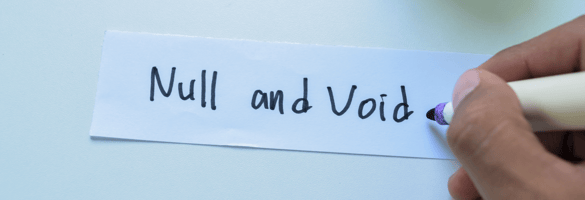CM Law's Ultimate List - The 50 FAQs about Making a Will
Avoid These Common Mistakes in Will Preparation to Prevent Future Disputes and Complications
A comprehensive guide to ensure your will is clear, legally binding, and accurately reflects your wishes. Mistakes in drafting a will can lead to family disputes, legal challenges, and unintended distributions of your estate.
1. What is a will, and why do I need one? Without a clear understanding, you may overlook important elements, causing potential disputes.
2. How do I make a will? Improper drafting can lead to a will being contested or deemed invalid.
3. What happens if I die without a will? Dying intestate means your estate is distributed according to state laws, not your wishes.
4. Can I write my own will, or do I need a lawyer? DIY wills can miss legal nuances, leading to invalidity or misinterpretation.
5. What should be included in a will? Missing key components can result in unclear intentions and legal challenges.
6. How much does it cost to make a will? Underestimating costs can lead to incomplete or improperly executed wills.
7. Can I update my will after it’s been made? Failing to update can render your will obsolete, not reflecting current wishes.
8. Who should I name as my executor? An unsuitable executor may mishandle estate administration, causing delays or disputes.
9. What is an executor, and what do they do? Executors have significant responsibilities; choosing the wrong one can lead to mismanagement.
10. Can I leave my property to anyone I want in my will? Ignoring legal restrictions can result in unintended distributions and challenges.
11. How do I choose a guardian for my children in my will? Inadequate guardian choice can lead to disputes over the care of your children.
12. What is a beneficiary? Unclear beneficiary designations can cause confusion and conflict among heirs.
13. Can a will be contested? Contested wills can lead to lengthy and costly legal battles.
14. What makes a will legally valid? Non-compliance with legal requirements can invalidate your will.
15. How often should I review my will? Regular reviews are essential to ensure your will reflects your current intentions.
16. Can I make changes to my will without a lawyer? Uninformed changes can unintentionally revoke or alter important provisions.
17. What happens to my debts when I die? Debts must be properly addressed to avoid burdening your heirs.
18. How do I ensure my will is carried out as I intended? Clear instructions are vital to prevent misinterpretation and ensure your wishes are followed.
19. Can I disinherit a family member in my will? Disinheritance must be explicit to avoid legal challenges from disgruntled relatives.
20. What is probate, and how does it relate to my will? Understanding probate is crucial to ensure your estate is properly administered.
21. How do I store my will to ensure it’s found after my death? Improper storage can result in your will being lost or inaccessible.
22. Do I need to notarize my will? Notarization can add an extra layer of validity, though not always required.
23. Can my spouse change my will after I die? Surviving spouses may have rights that override your will's instructions.
24. What is a living will, and how is it different from a last will and testament? A living will addresses medical wishes, which are separate from asset distribution.
25. How do I name someone to care for my pets in my will? Pets should be considered to ensure their care after your passing.
26. What is a holographic will, and is it valid? Holographic wills are often subject to stricter scrutiny and may not be accepted.
27. Can I use an online service to create my will? Online services may not cover all legal specifics, leading to potential invalidity.
28. How are digital assets handled in a will? Digital assets need clear instructions to avoid being overlooked or inaccessible.
29. What happens if I die and my will cannot be found? If your will is lost, your estate may be treated as if you died intestate.
30. Can I make a will if I am terminally ill or have a serious illness? Special considerations are needed for those with serious illnesses to ensure wishes are respected.
31. What is an advance directive, and should it be included in my will? Advance directives guide healthcare decisions, complementing your will.
32. How do I leave charitable donations in my will? Charitable donations must be clearly defined to ensure they are honored.
33. What is a trust, and how does it differ from a will? Trusts can provide additional control over asset distribution and tax benefits.
34. Can I appoint co-executors in my will? Co-executors can share duties, but may also conflict, causing delays.
35. How do I handle property in another country in my will? Foreign property requires specific legal handling to ensure proper distribution.
36. What is a codicil, and how is it used to amend a will? Codicils must be properly executed to effectively amend your will.0
37. Do I need a witness for my will? Witnesses are crucial to validate the will and prevent challenges.
38. What is the difference between a revocable and irrevocable will? Understanding the differences helps in choosing the right type for your needs.
39. How do I revoke my will? Proper revocation is necessary to avoid confusion and ensure your new wishes are followed.
40. Can a will cover funeral arrangements? Including funeral arrangements ensures your wishes are known and followed.
41. What is intestate succession? Intestate succession laws can override personal wishes without a valid will.
42. How do I handle life insurance policies in my will? Life insurance policies need clear instructions to ensure beneficiaries receive intended benefits.
43. Can a will be made online, and is it valid? Online wills must meet legal standards to be considered valid.
44. What happens if an heir dies before I do? Contingency plans are necessary to address the death of an heir.
45. How can I avoid family disputes over my will? Clear communication can help prevent disputes and ensure smooth administration.
46. What are the tax implications of my will? Tax implications must be considered to avoid unexpected liabilities for heirs.
47. Can I include instructions for my social media accounts in my will? Digital legacies need specific instructions to ensure proper management.
48. How do I ensure my will is compliant with state laws? State laws vary, so compliance is essential to validate your will.
49. Can a will be changed after death? Post-death changes are generally not allowed, emphasizing the need for accuracy.
50. What are common mistakes to avoid when making a will? Avoiding common mistakes ensures your will effectively reflects your intentions.



